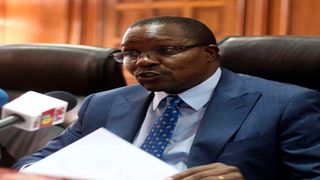
National Assembly clerk Michael Sialai.
| File | Nation Media GroupNews
Premium
The letter Anglo-Leasing suspects are banking on
A court has summoned the National Assembly clerk to confirm the authenticity of a document that suspects in an Anglo Leasing-related scandal are using to defend themselves.
Mr Michael Sialai will testify on the December 19, 2006 letter from the Office of the Clerk to the defunct Kenya Anti-Corruption Commission that claims 18 Anglo Leasing contracts received annual estimated allocations in the state budget.
The letter, signed by S.W Ndindiri, indicates that none of the projects were individually presented to the House for debate.
“During the years under reference (1996/97 to 2003/04), the record we have is that of the presentation of the Annual Estimates of expenditure which for each year lump together all ministries and government departments and their annual financial provision,” it says.
“Each year these were approved during debate in the Committee of Supply. The Appropriation Act for each year was accordingly passed thereafter to give legal effect to the annual estimates”.
The author informed the anti-corruption watchdog that “the Hansard would therefore not reflect any debate on the individual projects”.
The summons emerged during the second day of hearings in the case of Transport Chief Administrative Secretary Chris Obure, who is facing graft-related charges in relation to the scandal.
Public funds
Prosecutors objected to the use of the letter by Mr Obure’s lawyers to prove that there was no arbitrary expenditure of public funds on the Sh1.3 billion contract linked to procurement of equipment for the Postal Corporation of Kenya.
“The document is not from the Anti-Corruption Commission or the Director of Public Prosecutions. Its authenticity cannot be confirmed, so it cannot be used. The DPP is not saying it is a forgery but there are procedures on production of documents,” said a prosecution lawyer.
Senior Principal Magistrate Anne Mwangi also heard that investigators had not recommended the prosecution of Mr Obure, a former Finance Cabinet minister, over one of the Postal Corporation contracts.
Prosecutors say that on July 11, 2002, the government, on a single-sourcing basis, signed a contract agreement with a US-based company, Spacenet Corporation, worth $11,787,000 (Sh1,301,284,800) to supply equipment and services to Postal Corporation.
The equipment was named as VSAT hardware, computer servers, software licences and other communication services.
The court also heard that investigators filed two reports to the Director of Public Prosecutions with recommendations of persons to be charged for the alleged economic crimes and abuse of office.
Defending himself from the charges facing him, Mr Obure told the court that he was only included when the DPP raised the charges against the accused persons implicated in the scam.
“My name cropped up at the moment the DPP was raising the charges. Investigators said the charges are anchored on the basis of the reports,” he said.
The DPP received the files in 2014 and the suspects were arraigned in March 2015. Mr Obure is accused of abusing the public office, breaching public trust and conspiring to defraud the government.
Mr Obure fought off the charges, saying even evidence given by prosecution witnesses absolves him of any wrongdoing.
Breaching trust
On the charge of breaching trust by authorising former Finance secretary Samwel Chamobo Bundotich to sign contract documents on his behalf, Mr Obure said he did so on the basis of the authority given by the External Loans and Credits Act.
“When such authority is given, the person given is not under duty to make further enquiry,” he said.
He added that at the time he was involved in various other commitments and travelled abroad frequently to give reports on government reforms.
He also denied that Parliament did not approve the payments to Spacenet Corporation.
Mr Obure insisted the payments were budgeted for and the release of the money was proper and followed official procedures.
“Funds cannot be drawn from the Consolidated Fund without parliamentary approval,” said Mr Obure.
He quoted three prosecution witnesses, including government accountants who testified that the release of the funds was authorised by Parliament.
The hearing continues.






